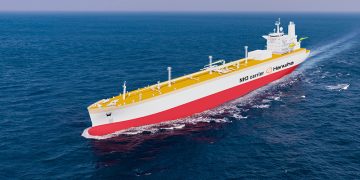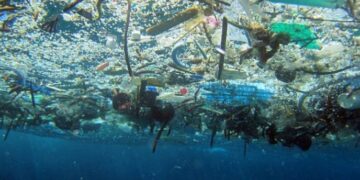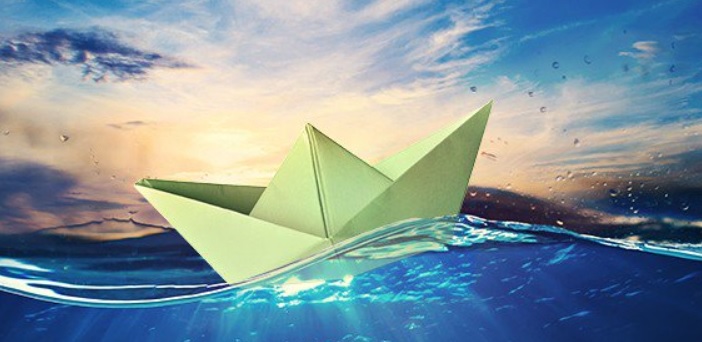Gavin Allwright, Secretary General, International Windship Association (IWSA), explains how sustainable shipping will create resiliency and efficiency within the industry. Referring to key priorities for a robust, resilient and sustainable maritime sector, Mr. Allwright highlights the need for an integrated approach that will ensure up-stream and down-stream impacts are always assessed in a transparent and collaborative way and emissions aren’t shifted, offset or dumped into other sectors.
SAFETY4SEA: In a nutshell, what does the word ‘sustainability’ mean to you?
Gavin Allwright: Sustainability means creating both resilience and efficiency within the system with the triple bottom line of economic, social and environmental benefit being integral to all decision making, not economic concerns as the primary with other considerations bolted on as an after-thought. Thus, we enhance our systems and pass those on in a better, more robust and efficient state than we found them.
S4S: How would you assess the current status of sustainability within the industry? What are your suggestions to move forward?
G.A.: The shipping sector has generated some challenging goals for mid-century and while these are not fully integrated into our practices, progress has been made. There is cause for optimism in emissions abatement, ballast water provisions etc., however, each issue is being dealt with in a piecemeal way that leads to delay, loopholes and compliance fatigue.
Creating positive, reinforcement loops are very important, for example; investment in hybrid propulsion solutions such as primary renewable energy (wind) + secondary renewable energy (batteries, H2, etc.) lead to lower levels of bunkering required, lower emissions, future proofing of vessels and ultimately enhanced facilitation of the secondary fuel infrastructure.
S4S: In your view, what would be the biggest shipping challenge in the years to come with respect to sustainable shipping?
G.A.: Carbon is a huge issue and occupies the top slot by far. While the IMO has set the challenge of 50% reduction by 2050, the caveat of ‘at least’ is critical here, as we need to move much faster and deeper to meet the target of keeping global warming at or close to 1.5C.
This is a global industrial issue of course and shipping must do its part and as part of that the siloed thinking of shipping as a defined and independent sector has got to change. Shipping is part of a logistics chain and thus, alternative fuels, integrated port/vessel operations, maximising benefits and emissions reductions in coordination with our freight customers etc. will all be key to meeting that challenge.
S4S: Which are the key drivers and barriers towards sustainable shipping?
G.A.: The drivers are many fold, and the last year or so has seen a number of these coming together to create an important momentum that is increasingly self-sustaining. There are five key areas that have affected wind propulsion technology uptake, and these can apply to wider sustainability issues to: Price, Policy, Providers, People and Perception.
The price of fuel is a key driver, not just at present but future prices and availability issues are important but also the reduction in cost of new technologies and operational changes are key too.
Policy changes and the creation of a more level playing field is also important, helping to drive the later adopters and enshrining early adopter advantage.
There has been an explosion of providers of new systems and services to upgrade vessels and fleets.
People and Perception are more difficult to quantify though, a new generation of upper management and design leads are coming into decision making positions, and that generation ‘get’ the environmental and social aspects of their work at a more fundamental level. The change of guard also feeds into the perception change; however, perception has changed throughout the logistics chain, within policy making circles and among the general public.
In the barrier bracket, the need to assess and act quickly is curtailed with a huge amount of uncertainty in the market place – What fuels will lead the way? Which technologies should I select? How will regulation and fuel price change in the coming few years, decades etc.? How will trade routes adjust and what types of cargos will be moved? and so on. That uncertainty can and will lead to inertia among many ship owners and investors.
Price, Policy, Providers, People and Perception are the key areas affecting wind propulsion technology uptake which can apply to wider sustainability issues.
S4S: When it comes to tackling the challenges with respect to sustainable shipping, what are the top three priorities on your agenda?
G.A.: For the International Windship Association, our main priorities are clear. Firstly, bringing as many of our member’s technologies into the demonstrator and pre-market position as possible over the next 18 months to give the market the all-important proof of concept they need for the adoption of new technologies, especially when such large fuel saving potential is available. The 5-20% saving as retrofit and possibly up to 30%, along with 30% and much higher for optimised new builds also needs credible third-party verification and several solutions are being developed for that purpose.
Finally, collaboration across the sector is also very important, as wind propulsion solutions will also help facilitate and benefit from other sustainable shipping developments. All wind propulsion systems are hybrid systems and a hybrid, holistic systems approach of energy management and application is vital.
S4S: What is your organization doing differently in order to prepare for a more sustainable future?
G.A.: We are developing a more resilient organisational framework that will enable faster and more integrated activities. This is focused on the development of regional wind propulsion hubs, or ‘centres of excellence’ that cluster together multiple stakeholders within each region, accessing regional resources, projects and funding while sharing best practice, policy coordination and wind propulsion outreach and education activities internationally.
We have already launched the IWSA Europe Atlantic hub in Nantes, laid the foundations for the hub in the North Sea & Baltic region and work is also underway for Oceania, North America and Asia.
A key issue for the industry is to adopt very clear guidelines for the assessment of full lifecycle costs and impact for all fuels, technologies and operational changes.
S4S: How can the international maritime community best support a robust sustainable development? Any suggestions?
G.A.: With the carbon issue, the adoption of a Norway NOx fund style, ring-fenced bunker levy would make a lot of sense, with the vast majority of funds returning to the industry in the way of grants or soft loans for GHG emissions abatement technology and operational changes, subsidies for smaller shipowners to make changes and least developed regions to decarbonise their shipping activities. This would fuel R&D, provide substantial work for shipyards and engineering companies, generate employment and help revitalise the industry across the board.
Another key issue is for the industry to adopt very clear guidelines for the assessment of full lifecycle costs and impact for all fuels, technologies and operational changes. We shouldn’t be using the 100 years global warming potential (GWP 100) criteria, but rather a 20-year (GWP20) calculation – this is especially important as we approach tipping points or environmental feedback scenarios within climate change. These scenarios risk uncontrollable natural runaway emissions (e.g. tundra and sea floor methane releases, ocean saturation etc.). An example of this change in emphasis is the calculation of that methane impact, rather than a 23-34 x the impact of CO2 calculation (GWP100), this is 84x under a GWP20 assessment, thus front-loading climate impact and this shift will reframe the decision-making process.
Thus, an integrated approach, where up-stream and down-stream impacts are always assessed in a transparent and collaborative way and emissions aren’t shifted, offset or dumped into other sectors is vital for a robust, resilient and sustainable maritime sector.
The views presented hereabove are only those of the author and not necessarily those of SAFETY4SEA and are for information sharing and discussion purposes only.
About Gavin Allwright, Secretary of International Windship Association (IWSA)
 Gavin Allwright has been the Secretary of the International Windship Association (IWSA) since it was established in 2014. Alongside his work as association secretary, he also leads the policy and finance work streams, requiring regular attendance at IMO, OECD and EU meetings. Gavin regularly presents updates on wind propulsion and on innovation development in the shipping industry at international Shipping fora. He chairs the annual Natural Propulsion Seminar as part of Blueweek and last year led the team that delivered the highly successful : Ambition 1.5C: Global Shipping’s Action Plan summit at COP23, an official UNFCCC Climate Partner event in Bonn, Germany. He is a non-executive board member of the World Wind Energy Association (WWEA), an advisor on the stakeholder committee for the IMO MTCC program, and sits on the advisory group of the ETI & BMT led VTAS program. He has also consulted on a number of EU Interreg projects developing wind propulsion solutions and networks along with sustainability projects in South Pacific and Japan. Gavin holds a Masters degree in Sustainable Development, specialising in small scale sustainable shipping and logistics in developing countries and is a frequent guest lecturer at universities around the world, including seminars at World Maritime University (WMU). He has contributed to numerous studies and projects on alternative propulsion solutions and helped coordinate and contributed extensively to the UN-affiliated IRENA technical brief – Renewable Energy Options in Shipping and as an expert reviewer of the IPCC Special Report on 1.5C Global Warming to be released in September.
Gavin Allwright has been the Secretary of the International Windship Association (IWSA) since it was established in 2014. Alongside his work as association secretary, he also leads the policy and finance work streams, requiring regular attendance at IMO, OECD and EU meetings. Gavin regularly presents updates on wind propulsion and on innovation development in the shipping industry at international Shipping fora. He chairs the annual Natural Propulsion Seminar as part of Blueweek and last year led the team that delivered the highly successful : Ambition 1.5C: Global Shipping’s Action Plan summit at COP23, an official UNFCCC Climate Partner event in Bonn, Germany. He is a non-executive board member of the World Wind Energy Association (WWEA), an advisor on the stakeholder committee for the IMO MTCC program, and sits on the advisory group of the ETI & BMT led VTAS program. He has also consulted on a number of EU Interreg projects developing wind propulsion solutions and networks along with sustainability projects in South Pacific and Japan. Gavin holds a Masters degree in Sustainable Development, specialising in small scale sustainable shipping and logistics in developing countries and is a frequent guest lecturer at universities around the world, including seminars at World Maritime University (WMU). He has contributed to numerous studies and projects on alternative propulsion solutions and helped coordinate and contributed extensively to the UN-affiliated IRENA technical brief – Renewable Energy Options in Shipping and as an expert reviewer of the IPCC Special Report on 1.5C Global Warming to be released in September.






























































